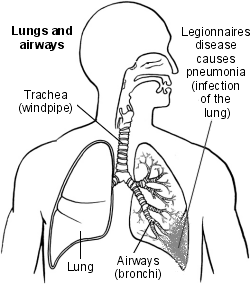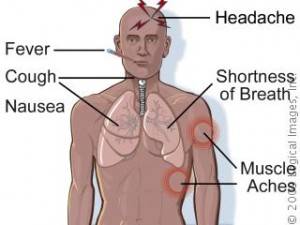Are you suffering from a bout of pneumonia? Are persistent coughs making you weak beyond words? Watch out, for you may be suffering from Legionnaires disease.
What is Legionnaires Disease?
Page Contents
It is a health condition that arises out of a severe lung infection known as ‘Legionellosis’. It is caused by a type of bacteria known as ‘Legionella pneumophila’. About 8,000 to 18,000 people in the U.S contract this disease every year. People suffer from it all through the year. Legionnaires Disease cases, however, increase in summers and early autumn. Patients of this ailment often suffer from an acute case of pneumonia. It is also known as ‘Legionnaires’ Disease’ or ‘Legion Fever’. The condition often becomes fatal for sufferers. 5 to 15 out of every 100 people suffering from the disease die every year.
How do you get Legionnaires Disease?
As mentioned earlier, this disorder is caused by infection due to the ‘Legionella pneumophila’ bacteria. This type of bacteria is found in warm, stagnant water. This type of bacteria cannot live or multiply in cold water. It needs water with higher temperatures to survive. This is why you can find the bacteria during the summer or autumn seasons in undisturbed water bodies like lakes and pools. In some cases, it may enter the artificial water supply systems. If you inhale this infected water, the bacterium may enter your respiratory system and make you sick.
Legionnaires Disease Causes
One of the most prime causes of Legionnaires Disease is the inhalation of the dreaded bacteria ‘Legionella pneumophila’. The average person is generally clueless about how and when the disease may strike him. This can be explained by the survival conditions of the Legionnaire bacteria. Generally, it is found in
- Air-conditioning units
- Cooling towers
- Hot tubs
- Spa
- Showers
- Water tanks
Naturally, any people using these systems can be easily affected. This is why a large number of cases are reported from hotels, hospitals and community buildings.
Who gets Legionnaires Disease?
The Legionnaires bacteria can affect any person. However, certain people are at more risk of suffering from the disorder. The high risk group includes
- People above 50 years of age
- Smokers
- Persons with kidney diseases
- Diabetics
- People suffering from lung disorders like Chronic Obstructive Pulmonary Disease (COPD)
- Cancer patients
- Leukaemia patients
Sick people and people with low immunity are particularly at risk of contracting this disease. Contact with affected water can jeopardize the health of even normal persons. Workers who clean water supply systems run a risk of contracting the disease.
Legionnaires Disease Symptoms

Picture 1 – Legionnaires Disease
Source – patient.co.uk
Some of the typical symptoms of Legionnaires Disease include :
- Chills in the body
- High fever, with about 104 degree F body temperature
- Persistent dry cough or cough with sputum
- Headaches
- Muscle aches
- Tiredness
- Loss of appetite
- Chest pains
- Nausea
- Vomiting
The symptoms of this disease are quite similar to pneumonia. The disease in fact, leads to pneumonia. Naturally, its diagnosis becomes quite difficult. However, Legionnaires disorder is sometimes accompanied with mild diarrhoea. In worse cases, blood comes out with cough. There may be other life-threatening complications like :
Respiratory Failure
The lungs may be unable to supply enough oxygen to the other parts of the body.
Kidney Failure
The kidneys may stop functioning. This will lead to the accumulation of fluids and waste materials inside the body.
Septic Shock
A blood infection leads to a sharp drop in blood pressure. This lowers blood supply to vital organs like the kidneys and the brain.
Legionnaires Disease Treatment

Picture 2 – Legionnaires Disease Picture
Source – skinsight
Legionnaires’ disease can be very serious if you do not treat it in time. Good medical help is an absolute must if you want immediate relief from this sickness. Treatment for Legionnaires Disease generally lasts for two weeks. Patients are administered antibiotic injections during this period. The medication often gives rise to side-effects like nausea, headaches, chest pains and dizziness. The patient usually feels a loss of appetite. In certain cases, intravenous liquids are passed to the body of the sufferer to prevent dehydration. Older patients or sufferers with low immunity or other illnesses need to be immediately hospitalized. This disorder leads to serious respiratory difficulties. That is why artificial oxygen is supplied to patients suffering from Legionnaires fever.
Legionnaires Disease Prevention
Legionnaires’ Disease is a painful ailment. But it can be kept at bay. There are certain steps that can assure the prevention of Legionnaires Disease. The most important of these is proper maintenance of water systems.
- Heating water at high temperatures can kill all bacteria and make it clean.
- The Legionella bacteria cannot survive in very low temperatures. Cooling water to below 20 degree centigrade can kill all germs instantly.
- The water should not be allowed to stand still at one place. Warm, stagnant water is the best place for the Legionnaires’ bacteria to reside.
- Removing slime from cooling towers can also help remove the germs. Cooling towers and evaporative condensers should be cleaned after every few months. This will prevent the survival and growth of germs.
- Cleaning whirlpool spas and hot tubs can take out the Legionella bacteria.
There are also some personal measures that you can take:
Quit Smoking
Smoking leads to chronic lung diseases like emphysema. People with chronic lung disorders are at more risk contracting this illness.
Wear Masks
If your job involves working near water treatment systems or air conditioners, you should wear a respiratory mask. It would block the bacteria from entering your lungs.
Avoid bathing in Unclean Environment
If you feel a tub or spa has not been cleaned properly, do not use it. Taking bath in unclean places can make you infected with this dreaded disorder.
Legionnaires Disease Tests
If you suspect yourself having this disorder, you should immediately conduct some tests like :
X-ray
A chest x-ray will show if your lungs have been infected. This will help in correct diagnosis and medication. As said before, diagnosis of this disorder is often a problem.
Urine Test
A urine examination will help your doctor know if legionella antibodies are present in your system.
Legionnaires Disease can lead to loss of life if not treated in time. If any of your dear ones fall sick due to this disease, you should seek immediate professional medical help.
References:
http://en.wikipedia.org/wiki/Legionellosis
http://www.nlm.nih.gov/medlineplus/legionnairesdisease.html
http://www.healthscout.com/ency/68/515/main.html
http://www.scienceclarified.com/Io-Ma/Legionnaires-Disease.html
http://www.medicinenet.com/legionnaire_disease_and_pontiac_fever/article.htm
http://www.wrongdiagnosis.com/l/legionnaires_disease/intro.htm

